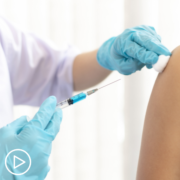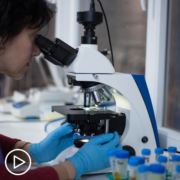What Do Advanced Non-Melanoma Skin Cancer Patients Need to Know About Treatment and Research?
What Do Advanced Non-Melanoma Skin Cancer Patients Need to Know About Treatment and Research? from Patient Empowerment Network on Vimeo.
What therapies are emerging for advanced non-melanoma skin cancer (ANMSC)? Dr. Anna Pavlick shares the latest in ANMSC research news, including developments in targeted therapy and immunotherapy.
Dr. Anna Pavlick is a medical oncologist with over 20 years of experience treating patients with skin cancer and is the founding Director of the Cutaneous Oncology Program at Weill Cornell Medicine and NewYork-Presbyterian. To learn more about Dr. Pavlick, visit here.
Related Resources:

A Review of Current Advanced Non-Melanoma Skin Cancer Treatment Options |

|

Is the COVID Vaccine Safe and Effective for Advanced Non-Melanoma Skin Cancer Patients? |
Transcript:
Katherine:
Are there developments in advanced non-melanoma skin cancer treatment and research that patients should know about?
Dr. Pavlick:
Well, I think when it comes to non-melanoma skin cancers, the developments over the last five years have been groundbreaking.
I think the first major advancement we made was to identify that the hedgehog pathway is a pathway that basal cell cancers follow in order to spread to other parts of the body. And we found out that if we can block that pathway, we can control basal cell cancer very easily because more than 90 percent of basal cell cancers use that pathway to spread. So it’s like a roadblock. If you’re doing construction and you come to point where you’ve got the detour, well, you can’t keep going straight ahead – you get stopped. And that’s what targeted therapies do, and we found that there are hedgehog inhibitors that are these roadblocks for basal cell cancer.
Dr. Pavlick:
So what has been evolved since then is looking at immunotherapy as a way to control non-melanoma skin cancers because, as you know, melanoma was the first place that immunotherapy really became paramount as the key treatment that makes the hugest impact on patients. And because of what we learned in melanoma, finding out that the number of mutations that melanomas have make it very susceptible to immunotherapy. We then went and looked at, “Well, what does squamous cell cancer have, what does basal cell cancer have?”
Well, we found out that basal cell, squamous cell and Merkel cell cancer have a very high mutational burden, and translating that, we said, “Well, we now know this: these are cancers that should now response to immunotherapy as well.” And they do. And they do very, very beautifully. Unfortunately, like every story, it’s not 100 percent of the tumors that will respond. It’s basically in the 50 percent range. So although it’s still a very high number, you need to know that going into it when you treat a patient with locally advanced squamous cell cancer, only 50 percent are going to have a response. So, if you don’t see that tumor getting better pretty darn quickly, you better start thinking, “This might be somebody who’s not going to respond to immunotherapy, and what’s going to be my Plan B?”
Katherine:
Right.
Dr. Pavlick:
Because squamous cell cancers in general respond very, very quickly to immunotherapy.
Usually within a matter of four to six weeks, you’re already starting to see improvement. When it comes to basal cell cancer on the other hand, basal cell cancers – because they develop very, very slowly over years – it takes months of immunotherapy to get them to respond. So I tell patients with locally advanced basal cell, “You really have to be patient, because we expect this to take somewhere between three and 6 months for us to start seeing something get better.” It doesn’t mean that it’s not working, it’s just basal cells just respond much slower. I think when patients are prepared and knowing that this is not a quick eight weeks – we’re going to know for sure whether this helps or not – it helps patients to be able to understand that, “I’m in this for at least six months –maybe longer.”










